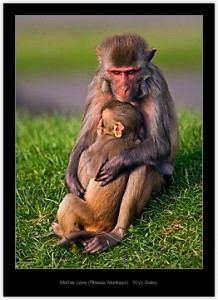
"No matter how tightly they clung to the surrogate mothers, however, the monkeys remained psychologically abnormal."
A note about an important shift in child rearing that occurred during the 1950s from “Hellhole,” a 2009 New Yorker article about solitary confinement by the Brooklyn-born surgeon and excellent writer Atul Gawande:
“Well into the nineteen-fifties, psychologists were encouraging parents to give children less attention and affection, in order to encourage independence. Then Harry Harlow, a professor of psychology at the University of Wisconsin at Madison, produced a series of influential studies involving baby rhesus monkeys.
He happened upon the findings in the mid-fifties, when he decided to save money for his primate-research laboratory by breeding his own lab monkeys instead of importing them from India. Because he didn’t know how to raise infant monkeys, he cared for them the way hospitals of the era cared for human infants—in nurseries, with plenty of food, warm blankets, some toys, and in isolation from other infants to prevent the spread of infection. The monkeys grew up sturdy, disease-free, and larger than those from the wild. Yet they were also profoundly disturbed, given to staring blankly and rocking in place for long periods, circling their cages repetitively, and mutilating themselves.
At first, Harlow and his graduate students couldn’t figure out what the problem was. They considered factors such as diet, patterns of light exposure, even the antibiotics they used. Then, as Deborah Blum recounts in a fascinating biography of Harlow, Love at Goon Park, one of his researchers noticed how tightly the monkeys clung to their soft blankets. Harlow wondered whether what the monkeys were missing in their Isolettes was a mother. So, in an odd experiment, he gave them an artificial one.
In the studies, one artificial mother was a doll made of terry cloth; the other was made of wire. He placed a warming device inside the dolls to make them seem more comforting. The babies, Harlow discovered, largely ignored the wire mother. But they became deeply attached to the cloth mother. They caressed it. They slept curled up on it. They ran to it when frightened. They refused replacements: they wanted only ‘their’ mother. If sharp spikes were made to randomly thrust out of the mother’s body when the rhesus babies held it, they waited patiently for the spikes to recede and returned to clutching it. No matter how tightly they clung to the surrogate mothers, however, the monkeys remained psychologically abnormal.”
